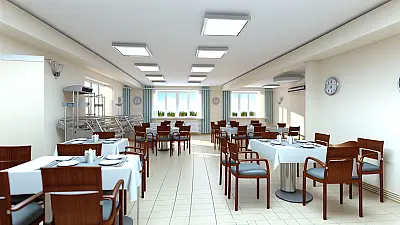NORTH MIAMI, FL - Federal inspectors identified significant quality assurance oversight deficiencies and equipment safety issues at North Dade Nursing and Rehabilitation Center during an August 2024 inspection, affecting systems designed to protect the facility's 208 residents.

Quality Assurance Program Lacks Required Oversight Structure
The most serious violation involved the facility's Quality Assurance and Performance Improvement (QAPI) program, which serves as the cornerstone for identifying and addressing care quality issues. Inspectors found the 155-bed facility failed to maintain adequate governance oversight of its quality improvement activities, a deficiency that could impact any resident receiving care.
The facility's QAPI committee met monthly with participation from key department heads including the administrator, medical director, director of nursing, and various department managers. However, the program lacked proper oversight mechanisms required by federal regulations. The quality assurance committee failed to communicate its activities and progress to the governing body at required intervals, specifically missing the mandate for quarterly communications and annual formal meetings with facility leadership.
This oversight gap represents a fundamental breakdown in the accountability structure designed to ensure continuous quality improvement. The facility's own policy, implemented in June 2021, required governance oversight responsibilities including annual approval of the QAPI plan, ensuring adequate resources, and setting clear expectations around safety and quality.
Medical quality experts emphasize that effective QAPI programs require robust governance oversight to function properly. Without proper leadership accountability, quality improvement initiatives can lose focus and fail to address systemic issues that directly impact resident care outcomes.
Medical Significance of Quality Oversight Failures
Quality assurance programs in nursing homes serve as the primary mechanism for identifying patterns of care deficiencies before they result in serious harm to residents. When governance oversight breaks down, facilities lose their ability to systematically address recurring problems, potentially allowing dangerous care patterns to persist undetected.
The inspection revealed that while the facility conducted monthly QAPI meetings and included appropriate interdisciplinary team members, the lack of proper governance communication meant that identified quality issues may not have received adequate leadership attention or resources for resolution. This structural deficiency affects the facility's ability to sustain quality improvements during leadership transitions and ensure that corrective actions effectively address system-wide gaps.
Federal regulations require nursing homes to maintain comprehensive, data-driven quality improvement programs specifically because vulnerable elderly residents depend on systematic approaches to care quality. Without proper oversight, even well-intentioned quality improvement efforts can fail to translate into meaningful improvements in resident outcomes.
Contaminated Equipment Poses Health Risks
Inspectors also documented equipment safety violations that created direct risks to resident health. A microwave used to heat residents' food in the facility's J unit nourishment pantry contained brown rust stains and dried substances, affecting approximately 35 residents who receive oral nutrition on that unit.
The contaminated microwave was observed during inspection on July 30, 2024, with facility staff confirming the presence of rust-like staining. The Director of Nursing acknowledged the equipment condition and committed to replacement, but the violation highlighted gaps in the facility's equipment maintenance protocols.
Food preparation equipment contamination presents serious health risks for nursing home residents, who often have compromised immune systems and multiple chronic conditions that make them particularly vulnerable to foodborne illnesses. Rust contamination in food heating equipment can introduce harmful bacteria and chemical contaminants that may cause gastrointestinal illness or more serious complications in frail elderly residents.
Industry Standards for Equipment Safety
Federal regulations require nursing homes to maintain all essential mechanical, electrical, and patient care equipment in safe operating condition. The facility's own safety policy, established in March 2021, specifically mandated maintaining equipment safety standards, yet the contaminated microwave violation demonstrated a failure to implement these requirements consistently.
Proper equipment maintenance protocols should include regular cleaning schedules, visual inspections for signs of wear or contamination, and immediate replacement of equipment showing signs of deterioration. Food service equipment requires particular attention because contamination can directly impact resident health through the food chain.
The violation occurred in a nourishment pantry, where staff prepare snacks and supplemental nutrition for residents who may have difficulty maintaining adequate caloric intake. For many nursing home residents, these supplemental feedings are medically necessary to prevent malnutrition and maintain health status, making equipment safety in these areas particularly critical.
Impact on Resident Care Quality
Both violations reflect systemic issues that can compromise the quality of care residents receive. The quality assurance oversight deficiency affects the facility's ability to identify and correct problems systematically, while the equipment safety violation demonstrates gaps in basic infection control and safety protocols.
When quality oversight systems fail to function properly, nursing homes lose their primary mechanism for preventing care quality deterioration. Research demonstrates that effective quality improvement programs can significantly reduce adverse events, hospitalizations, and other negative outcomes for nursing home residents. Conversely, facilities with weak quality oversight often experience recurring problems that could have been prevented through systematic intervention.
The equipment safety violation, while affecting a smaller number of residents directly, represents the type of basic safety failure that effective quality oversight programs should identify and address before regulatory intervention becomes necessary.
Additional Issues Identified
During the comprehensive inspection, surveyors also documented other areas requiring facility attention, though these were considered less severe than the primary quality oversight and equipment safety violations. The inspection covered multiple aspects of facility operations to ensure compliance with federal nursing home regulations designed to protect resident health, safety, and quality of life.
The facility's response included immediate commitments to replace the contaminated equipment and address quality oversight deficiencies. Implementation of corrective measures will require ongoing monitoring to ensure that systematic improvements prevent recurrence of similar violations.
Full Inspection Report
The details above represent a summary of key findings. View the complete inspection report for North Dade Nursing and Rehabilitation Center from 2024-08-01 including all violations, facility responses, and corrective action plans.
💬 Join the Discussion
Comments are moderated. Please keep discussions respectful and relevant to nursing home care quality.